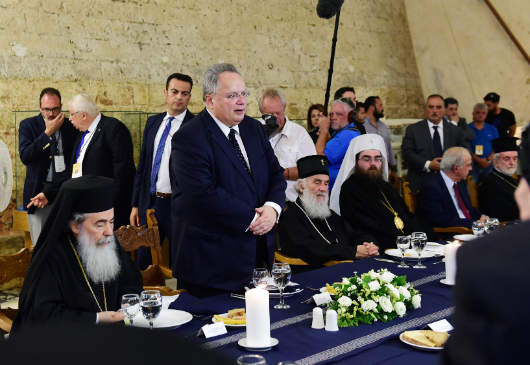 Your All Holiness, Beatitudes, Eminences,
Your All Holiness, Beatitudes, Eminences,
It is a great honor, this year, to have with us today your family and your great embrace, in which so many people find solace and hope for the future.
We are living in a difficult era; the era we call, academically, the era of globalization. It is an era in which many issues are changing with regard to people’s way of life. It has many characteristics of transition, and this is creating, for hundreds of millions of people, new needs as well as new insecurities regarding their future, their fate. And the Word of the Church, which gives solace, is a vital source of strength that helps them to bear up in today’s world.
We – including myself, whom you honor today as Foreign Minister and representative of the country – are joined together by this tender task of caring for people. You, through your social work, and we, through our actions and effort to realize people’s hopes and dreams, show that the secular and the Church can and must move together in remedying the problems of your Flock, the citizens, to ensure a better life for all.
As the Church, you teach – and I always urge that we teach this all together – the sense of solidarity, the sentiment of charity and responding to the tender souls of children, to the needs of older people who are confronting life itself, for the majority of people, who struggle in their daily lives.
The secular and the Church – on this common course benefitting people, citizens, your Flock – are a common, brotherly pole based in great values that you cultivate, that you profess and that we believe must also correspond with action, both our actions and those of everyone.
This is a difficult era. People are seeking, with their souls and their minds, solutions to the problems of the era. And this is why we hope and believe that this Great Council of Orthodoxy will give hope, will heal tribulations and will give the faithful the opportunity to pray for you and for the rest of the citizens of countries where there are Orthodox Churches, to find hope, to understand the message of the Church.
For me, personally, it is a great honor that you accepted the invitation to our table today, so that we can talk about how we, as servants of the people, can work for their good and ensure even better dissemination, through our deeds and conduct, of universal human values. And as I always say to You and to figures of the Orthodox Churches, you are our greatest collocutors on spirituality, the spiritual search, as well as a great support for the social work that we must carry out all together.
I thank you for honoring my with your attendance here, and I thank all of those who, through their presence, honor, in my person, the Greek state. I promise, once again, that we will help and we will work and we will support the needs of the Flock, the efforts you are making and that we greatly respect, perceiving your dignity, the Churches need for unity, and the need for the Church, its Word, to be reflected, through its work, in the conduct of all of us.
One doesn’t have to be religious on a day-to-day basis, one doesn’t even have to be a member of the Church, to understand that these great values are universal human values and concern everyone, the faithful and those who are not, in a sense, faithful, but, through their conduct in their lives, are people who live as Christians, people with morality and a moral code.
I thank you very much for the honor you do me, and may you always embrace me with your family. I am very fortunate in life to be at this table with all of you.
I thank all of your very, very much for being here.
June 16, 2016


